The Lost Daughter Read online
Page 29
Chapter 45
Leningrad, November 1942
WHEN STEPAN RETURNED, HE WAS SHOCKED BY HIS MOTHER’S condition. She was shivering with fever and delirious with pain. He piled on extra blankets and stoked a fire in her bedroom. Doctors didn’t make house calls anymore, and he had no way of getting her to the hospital. They did not have so much as an aspirin powder in the house, but he remembered his father’s teaching and made a poultice of comfrey root from a plant in the courtyard, then wrapped it around her thigh.
Over the next week, Maria drifted in and out of consciousness. She had complicated dreams in which she was running in the grounds of the Alexander Palace with her brother and sisters, looking for someone who was missing. She moaned and murmured, “Tatiana.”
“Who is Tatiana?” a voice asked, and she opened her eyes to see Stepan. Why did he not know?
“Your aunt, of course,” she said, gritting her teeth against a wave of pain before drifting off again.
One night she woke in pitch dark and wondered if she had already died. She could hear voices in her head. “Let go, Maria. Come to us. It’s your time.” It felt as if they were trying to drag her down a long tunnel. She could sense her family was there, but not Peter. Why did he not come for her? Maybe that meant they were wrong and it wasn’t her time . . . But it must be close. She was too ill. She would not survive this.
Stepan appeared at her bedside with a flickering kerosene lamp. “You were moaning, Mama. Can I get you something?”
She shook her head. It was impossible to swallow now. She knew she didn’t have long. But there was one last thing she must do before she died. She must tell Stepan that they were Romanovs, because otherwise the truth about their heritage and an important part of Russian history would be lost forever. He was a sensible soul who would not take the risk of telling others. But where to begin?
“I was born Maria Romanova,” she said, her voice faint and husky. “I grew up at the Alexander Palace in Tsarskoe Selo. My father was Tsar Nicholas, my mother Tsarina Alexandra. I had three sisters, Olga, Tatiana, and Anastasia, and a little brother, Alexei.” The words flowed once she had started, and he listened carefully, narrowing his eyes in concentration. What if he did not believe her? He must.
When she reached the part about their house arrest and then the brutal execution in the basement, tears filled his eyes. Good. That meant he believed her.
“I opened my eyes where I lay in the back of a truck, facing a fate worse than death at the hands of the men who swarmed all around, and there was your father. Peter.” She choked up at the memory. “I asked him to help me and he picked me up and ran into the forest. For three days he ran with me on his back, stopping only to tend my wounds and rest a few hours. He saved my life.”
“That’s where the jewels came from,” Stepan whispered, his eyes glistening in the lamplight. “I understand now.”
There was more she had to tell him. “You need to know that Tatiana did not die in the basement. She had gone to meet her lover, Dmitri Malama, to plan our rescue. I have tried to find her since then but with no luck.”
“You have often murmured her name during your illness,” Stepan said.
“My aunt Olga lives outside Copenhagen. We have written to each other but it proved impossible to visit. When I die, you must get word to her somehow.” She closed her eyes, sad to think she would not see Olga again.
“Mama, you will not die,” Stepan insisted. “Stay with us. Please.”
She reached for his hand, squeezed it tightly. “I’m trying.” She racked her brain. There was something else he had to know. “Your father’s real name was Vasnetsov. He had a mother and sister in Ekaterinburg. We have written to them but have not been able to tell them where we are . . .” She paused, too weak to think clearly. Hopefully he would understand.
“Did you know Papa before he rescued you?” Stepan sounded overcome with emotion.
“He was a guard at the house. One of the good ones.” She remembered him there: so shy and tongue-tied.
“Were you lovers?” Stepan whispered, stroking her hand.
“No, we were friends.” She remembered how awkward he had been when she took his photograph at the top of the stairs. “We didn’t become lovers till the end of the summer, when my wounds had healed.”
Stepan paused. “But how is that possible when I was born on the third of April? Was I premature?”
Maria was dumbstruck. It hadn’t occurred to her he would work that out.
“You must have been lovers before,” Stepan persisted.
Maria was tempted to lie to him. The truth was too awful. But she felt sure she would not live through the night, and now was the time for truth. “Your father was another guard in the house, a man who raped me. His name was Anatoly Bolotov. I’m sorry, Stepan.”
He pulled his hand away from hers and cried, “No!”
Straightaway Maria hated herself for telling him. She should have lied. If only she’d been thinking straight, she would never have blurted it out. “It made no difference. You were Peter’s son in every sense. You are more like him in character than any of your siblings.”
Stepan stood up, the lamp swaying. “No!” he whispered again, horror in his voice, and strode toward the door.
“Don’t go!” Maria called after him, but he left the room and she heard his bedroom door slam behind him. She had done a terrible, unforgivable thing. Stepan would be devastated and there had been no need for him to know. A tiny lie was all it would have taken. She squeezed her eyes tight shut in shame.
* * *
She woke the next morning as Irina came into the room carrying a cup of comfrey infusion, its crisp cucumber scent cutting through the smell of woodsmoke and her own sweat.
“Where’s Stepan?” she asked straightaway.
“He’s gone to work,” Irina told her, sitting carefully on the edge of the bed, placing a hand on her mother’s forehead.
Maria turned her face away. She yearned to speak to him, to explain.
“I think your fever has broken, Mama,” Irina said. “Here. Try to drink.”
It was true. Maria felt better, as if she had emerged from a cocoon of fuzziness into the clear light of day. Perhaps sharing her secret had helped—but she had shared too much. Peter would be cross with her. There had been no need.
She heard Stepan return later and called for him. He appeared in the doorway, such a wounded expression on his face that she felt a stab of remorse.
“I just wanted to say that I’m sure you will have questions for me and you may ask me anytime.”
He nodded. “I need to think first. But thank you.”
Maria fought back tears. “You must understand that Peter was your father by any measure that counts. Your character, your morality, your strength, your humor—all are his.”
“Was Anatoly Bolotov dark-haired?” he asked, and Maria nodded, sucking in her lips. “I have often wondered why I am the only dark one in the family. And now I know.”
“Please don’t blame me,” she begged.
“It wasn’t your fault my father was a rapist. Don’t worry, Mama. I just need time to get used to this news. I’ll be all right.”
He turned, and she heard the clank of the metal shovel as he began scraping the ashes from the fire in the next room.
* * *
Maria sat on the edge of her bed and tried to stand up but could not manage. Her broken leg ached with the effort and the other one seemed to have stiffened up and would not bear her weight. She lay down and exercised on the bed: bending her knee then straightening it, sliding her leg out to the side, lifting it off the sheet. It hurt, but she must get some strength back if she was ever to walk again. Twice now she had thought she was about to die and God had given her a reprieve. It was up to her to snatch this chance with both hands.
One evening Stepan came home shouting in excitement. “Everyone! Come and see what I have brought.”
He burst into Maria’s bedroom carryi
ng a canvas bag from which he produced a chicken. A whole chicken, complete with head and feathers! It was followed by a bunch of carrots and a round cabbage, then he held open the top of the bag to show a pile of muddy potatoes. “Our troops have opened a land corridor along the shores of the lake. These supplies arrived this morning and all the gunners got a share.”
Maria started to cry. She couldn’t help it. “Will the war be over soon?” she asked. “Does this mean we are winning?” If there was a land corridor, surely Mikhail and Katya would return?
“It’s a start, Mama. We will beat them back from Russian soil, inch by inch and foot by foot.”
Her stomach gurgled at the aroma of the chicken boiling in the pot, and when she sipped the rich, flavorful broth Irina made, she could feel warmth spreading through her bones and strength flooding her veins. It hadn’t been her time to die. She had to get used to the idea of living.
“What date is it today?” she asked Yelena, who had come to sit with her.
“The eighteenth of January.”
“What year?” she asked, confused. It had been the end of October when she fell on the ice. Had she really been in bed for nearly three months?
“Nineteen forty-three, of course.”
Maria set herself goals: by the end of January she would be walking around the apartment; by the end of February she would walk to the park. And in March she would start searching for Mikhail and Katya in earnest. She wanted them back in Leningrad with her and their siblings in time for the summer, and she wouldn’t take no for an answer.
Chapter 46
Sydney, October 1975
VAL WAS THRILLED WHEN A LETTER ARRIVED TELLING her she had been accepted on the history course at the university, starting the following January, and straightaway she began working through the recommended reading list. She felt self-conscious about the gaps in her knowledge. History had been taught in a piecemeal fashion at her school. She knew about Captain Cook and the convict colony at Botany Bay; she knew about the Federal Constitution declared in 1901 and about all the Australian soldiers who had died at Gallipoli in the First World War. But what had happened in between? And how about the rest of the world?
The course would last three years, and at the end she would have to submit a dissertation. She decided she would like to write about the fate of the Romanovs. It was a subject on which she had firsthand information, and Bill Koskov might be able to help if any documents had to be translated from Russian.
Until the course started, she continued working at the telephone exchange, and he often stopped by to say hello. Bit by bit she learned more about him. He was single and lived with a sheepdog called Bess in a house across the bay at Manly, where he was in easy reach of good surfing beaches. He cycled to the university from the ferry dock every morning and then back in the evening, in all weathers, so he must be sportier than she had thought. And he liked going to the movies. Val had never been to the cinema because Tony didn’t fancy sitting still in the dark without a beer in his hand. Bill was aghast when she told him that she hadn’t seen Jaws, or Picnic at Hanging Rock, or The Rocky Horror Picture Show.
“These are classics,” he exclaimed. “You’re missing out on the cultural landmarks of your time.”
Val shrugged, with a smile. “Kinda goes with the territory when you have a little one.”
“Don’t you have a friend who can babysit?” he asked. “Come and see One Flew Over the Cuckoo’s Nest with me next Saturday. Jack Nicholson’s in it and the reviews are ecstatic.”
Val was taken by surprise. Did he mean this to be a date? No, it couldn’t be. “I’ll, erm, ask a friend and let you know,” she replied.
She rang Peggy, who was instantly enthusiastic.
“It’s about time you went on a date,” she gushed. “You’re in your prime. All that perfect skin and gorgeous black hair and no one to appreciate them: it’s a crime.”
Val protested. “There’s no way I want a boyfriend. I haven’t got time, and Nicole and I are happy on our own.”
“Just go!” Peggy chided. “You’ve got nothing to lose. I’ll have Nicole for a sleepover in case you are overcome by lust.”
“Lust? What’s that?” Val replied. “I’ve read the term in books but never experienced it.”
Peggy laughed, but the fact was, Val thought, it was true.
* * *
She sat awkwardly in the cinema, careful not to let her elbow touch Bill’s on the armrest. They shared a box of popcorn but he ate most of it, scooping up huge handfuls and hoovering them down. The film was excellent: funny and affecting, and Val had to wipe away tears before the lights came up at the end.
Bill insisted on walking her home, wheeling his bike beside him, and they talked about the themes of the movie—mental illness, the use of electroconvulsive therapy—and the great performances by the cast.
At Val’s front gate, he carried on talking and she worried that he expected to be invited in. Would he want coffee? Or a beer? Or would he expect to have sex? She tried to remember if she was wearing matching undies. If they did have sex, would it be awkward at work on Monday? Would he think she was an easy lay? She was so busy worrying that she had stopped listening to what he was saying and was jolted back to the present when he remarked, “Do you know, I’ve never told anyone about that before. You’re a great listener.”
He leaned over and touched his lips to hers, and she tensed. It wasn’t a long kiss. He didn’t try to put his tongue in her mouth, which she hated. But it was a kiss that was more intimate than friends would share. And it was nice.
When he broke away, he smiled. “Can we do this again sometime? I need to educate you about cinema, after all.”
“OK. Yes, I’d like that,” Val replied, feeling like an idiot.
Bill started to wheel his bike down the road. At the corner, he turned and bowed ostentatiously. Val waved.
She lay in bed afterward, curled in a fetal position, her hands pressed between her thighs, nerves all aflutter. What was it that he’d never told anyone before? How could she find out now? Had she kissed him back too much or too little? Should she have invited him in? Did he like her? It certainly seemed that way. What if they started dating and it didn’t work out but they had to carry on working in the same place? The mixture of anxiety and excitement kept her awake until the early hours, and she was groggy but smiling ear to ear when she collected Nicole from Peggy’s the following morning.
* * *
Next time they went to a movie Bill suggested dinner first, and it was lovely. Conversation flowed and they laughed easily, but still he seemed happy to leave her with a kiss at her front gate.
Maybe he doesn’t fancy me? Val worried. Maybe he’s just being friendly.
Then there was another date, and another, and suddenly it was Christmas break.
“Would you and Nicole like to come to Manly for a day over the holidays?” he asked. “I’ll make lunch, and I’m near the beach so you could have a splash in the waves.”
Val fretted over this. What would she tell Nicole? How would she explain who Bill was? In the end, she said a friend had invited them, and Nicole replied, “Cool!” and didn’t ask any questions.
Bill’s house was like a summer rental, just a couple of blocks from the beach. When he opened the door, his dog poked its head out to greet them, and Nicole squealed with delight and reached out to pat her.
“She’s so soft,” she cooed, stroking the silky ears.
“Her name’s Bess and she’s four years old,” Bill told her, but Nicole was so absorbed in the dog that she ignored him.
“Mommy, can we get a dog like this? I love her,” she trilled.
“I don’t know how she would get on with Toffee,” Val cautioned. Toffee was Nicole’s pet rabbit, who lived in a hutch in their backyard.
“They’d be best friends,” Nicole said airily, the expert on such matters.
Bill led them through to a big kitchen with glass doors opening onto a sunny terrace. On a
table he had laid a spread of salads, cold meats, and roast chicken legs.
“I decided to make a self-service picnic in case there’s anything you don’t like, Nicole,” he told her.
She glanced at the table. “Eggs are the only thing I don’t like.”
“Phew! I didn’t do eggs.” He grinned.
They ate on the terrace. Bess lay by Nicole’s feet, eyes half closed but still alert for any food that might be dropped.
“I think you have a fan,” Bill said, and Nicole smiled, pleased with herself.
“I’m good with dogs,” she said, although as far as Val was aware, she hadn’t known any others.
Val had worried what they might talk about and whether there would be awkward silences, but they chatted about Bess, then about kites, and cycling. Nicole had not yet learned to ride a bike, and when she told Bill, he offered to teach her, then glanced quickly at Val to see if he was overstepping the mark.
“That’s very kind,” she said, wondering if he had meant to make such a big promise.
When she went to the bathroom, she had a chance to look around the house. It had wooden floors and basic furniture, little in the way of ornament, but it was clean and tidy. A surfboard painted in pink and purple swirls stood against one wall, a bookshelf was built into an alcove, and there was a large TV in the corner. It was a man’s house but it looked comfortable. All the time she was collecting information, storing it away. Who was this person? Could she trust him? Would he ever hit her or break her bones? She hadn’t known many decent men in her life: there was Peggy’s husband, and a few of their friends, but otherwise she’d been let down by every man she had ever come across.
After lunch, they went to the beach. Val was shy taking off her sundress to reveal her figure in a swimsuit, but Bill set her mind at rest by winking in a way that was appreciative without being lascivious. He seemed lankier and more angular in his trunks than with his clothes on—all elbows and knees and skinny torso. He and Nicole ran down the beach with a big psychedelic-patterned kite, shrieking with laughter as it nearly lifted her off the ground.

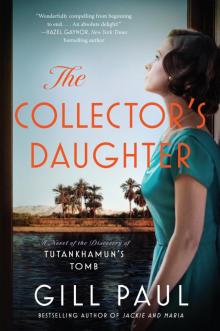 The Collector's Daughter
The Collector's Daughter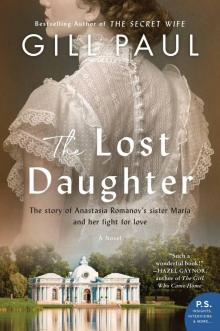 The Lost Daughter
The Lost Daughter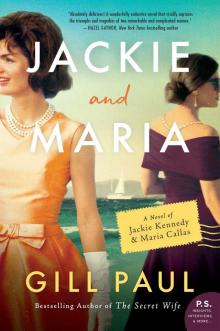 Jackie and Maria
Jackie and Maria The Affair
The Affair Love...Maybe
Love...Maybe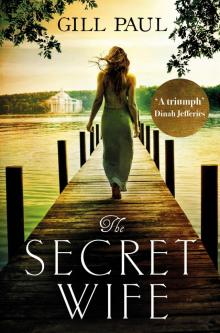 The Secret Wife
The Secret Wife No Place For a Lady
No Place For a Lady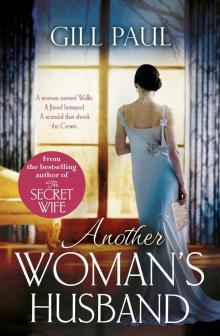 Another Woman’s Husband
Another Woman’s Husband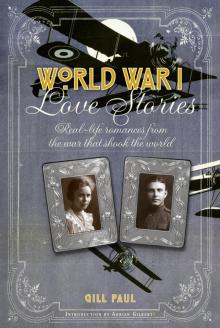 World War I Love Stories
World War I Love Stories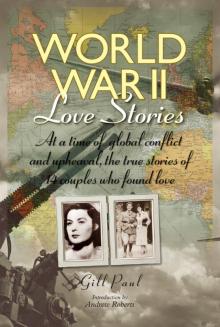 World War II Love Stories
World War II Love Stories